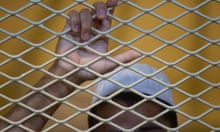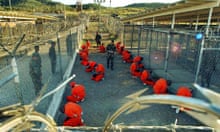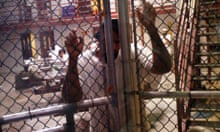The photograph was one of the most poignant images of the aftermath of 9/11. Twenty men dressed in lurid orange jumpsuits, eyes obscured behind blackened goggles, hands and legs shackled, cower behind chainlink fences as US soldiers stand over them.
It was taken four months to the day after the terrorist attacks, and seemed to sum up the mood of American vengeance. You may have brought down the twin towers, the image seemed to say, but look what we've done to your leaders.
Ten years on, little of that early bravado remains. The primitive cells where those first 20 detainees were held on 11 January 2002 have been transformed into a multimillion-dollar complex replete with satellite TV and air conditioning.
Despite President Obama's promise to close the camp, there it still stands, mocking America's claim to moral supremacy and acting as a powerful recruiting tool for the country's enemies. The numbers, pulled together by the American Civil Liberties Union (ACLU), speak for themselves. Of 779 detainees imprisoned at Guantánamo over the past decade, only six have been convicted. That's one less than the number of military prosecutors who resigned over the system's unfairness. Some 600 have been released, most under President Bush, raising the question of why they were there in the first place.
The ACLU's Hina Shamsi said: "Guantánamo has been a catastrophic failure on every front: legally, ethically, and in terms of our security. There are 171 captives left in the camp, and of those, 89 have been cleared for release but are still stuck there in a Kafkaesque limbo. That comes at an annual cost to the US taxpayer of $800,000 per captive." With 17 soldiers guarding each inmate, Guantánamo isn't cheap.
A further 46 unidentified men were designated under last year's inter-agency review as being "too dangerous to transfer but not feasible for prosecution" – there isn't sufficient evidence to put them on trial, but nor will they be released.
"We must restore the standards of due process and the core constitutional values that made this country great." That statement could have been made by any one of the many Guantánamo critics still campaigning for its closure. In fact, the words were spoken by Obama on 22 January 2009, the day after his inauguration, as he signed an order to close the camp within one year. So what went wrong?
Pardiss Kebriaei of the Centre for Constitutional Rights, who has acted as defence lawyer for four detainees, believes the rot set in at the very moment of the signing. At that point, she said, Obama could have told the American people the truth about Guantánamo detainees: that most of them are low-level operatives who are a far cry from the "worst of the worst", as they were described when the first 20 arrived exactly a decade ago.
In fact, according to the US government's own data, 92% of the men who have been brought to Guantánamo never fought for al-Qaida at all.
Three of the four men Kebriaei represented have been released, one of whom held the impressively senior rank of assistant cook. "This was a young man who was 17 when he was taken into custody. He was not remotely like the dangerous terrorists who would chew through the pipes of a plane to bring it down, in Donald Rumsfeld's famous phrase," Kebriaei said.
That first moment has set a pattern of missed opportunities. The Obama administration stalled on sending Muslim ethnic Uighurs to asylum in mainland US, even though they were deemed harmless back in 2005; five Uighurs are still trapped in Guantánamo to this day.
Then the administration bottled on its plans to send Khalid Sheikh Mohammed and his four co-defendants accused of having masterminded 9/11 to federal trial in New York. The five will now be dealt with under Guantánamo's revived military commissions.
The U-turns have allowed the Republicans in Congress to erect looming hurdles in the path of closure. A year ago Congress barred the Pentagon from spending any of its budget on transferring detainees out of Guantánamo. Then, on 31 December, Congress framed another act that for the first time enshrines the right to indefinite detention without charge into US law. That was violation of habeas corpus even Bush lacked the temerity to introduce.
In both these cases Obama expressed his dismay about the new laws, held his nose, and signed on the dotted line.
The US authorities have tried to lessen the international damage by suggesting Guantánamo is now a state-of-the-art facility with soccer fields and education classes. But today most of the remaining detainees will embark on a peaceful protest of sit-ins and hunger strikes designed to show that from their vantage point the camp remains a hellhole.
Shaker Aamer, the last remaining British resident in Guantánamo, who will mark his 10th anniversary there next month, said through his lawyer, Ramzi Kassem, that the aim was to "send out a powerful message to the world that Guantánamo remains unacceptable".
Certainly, conditions have improved from the darkest days when detainees were subjected to "enforced interrogations" – torture – and when female soldiers would smear fake menstrual blood on them and lap dance in a perverse attempt to extract intelligence.
But for Colonel Morris Davis, who resigned as chief prosecutor of the Guantánamo military commissions in October 2007 in protest at the use of evidence obtained through torture, the damage lives on. "Guantánamo is a stain on our reputation," he said. "The only way we can end that chapter is to close it."







